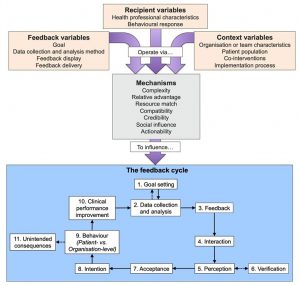Theory
There are many different theories from different disciplines that can be applied to healthcare; some theories are exclusively about feedback whereas some include feedback as a component. Different theories discuss feedback in different context. However, only few studies explicitly used theory to design their A&F intervention and none of them used theory specific to A&F (see Table below).
To increase the consistency and magnitude by which A&F interventions achieve change we need to design interventions informed by extant theory and empirical evidence. Using theory can help to define and clarify potential mechanisms of action helping to create more effective interventions (Colquhoun et al. 2013).
Examples of theories specific to A&F are Control Theory, Goal Setting Theory, Feedback Intervention Theory and the newly developed Clinical Performance Feedback Intervention Theory (CP-FIT).
- Control Theory suggests that people will develop action plans to achieve behaviour change when observing a discrepancy between current practice and target behaviour.
- According to Goal Setting Theory people are motivated to achieve a goal rather than eliminate the discrepancy.
- Feedback Intervention Theory builds upon these two theories and suggests that feedback that directs attention towards acceptable and familiar tasks (as opposed to those that generate emotional responses or cause deep self-reflection) seem most likely to lead to improvement.
- Clinical Performance Feedback Intervention Theory (CP-FIT) builds upon 30 pre-existing theories and states that effective feedback works in a cycle of sequential processes. Feedback’s success is influenced by several factors: the feedback method used, health professional receiving feedback, and context in which feedback takes place.
Various recent A&F studies now use these theories in their design such as Gude et al. and Hartley et al.
The Table below provides a list of all of the theories identified from the 2012 Cochrane update on audit and feedback interventions. This table has been adapted from Table 1 in Colquhoun et al. 2013
| TYPE | THEORY | AUTHOR | YEAR |
|---|---|---|---|
| Education | Adult Learning Theory | Knowles | 1984, 1990 |
| Theory of Medical Education | Coles & Holm | 1993 | |
| Diffusion | Diffusion of Innovations | Rogers | 1983, 1995 |
| Technology Diffusion Theory | Penland | 1997 | |
| Organization | Diffusion of Innovations in Service Organizations | Greenhalgh, Robert, Macfarlane, Bate & Kyriakidou | 2004 |
| Lawler’s Organization Theory | Lawler | 1976 | |
| Organization Development Theory | Levitt | 1965 | |
| Kirkpatrick’s Hierarchy of Levels of Evaluation | Kirkpatrick | 1967 | |
| Psychology | Social Cognitive Theory | Bandura | 1969, 1986, 1997 |
| Transtheoretical Model | Prochaska & DiClemente | 1982, 1986, 1992 | |
| Theory of Reasoned Action | Fishbein, Fishbein & Ajzen | 1979, 1968 | |
| Theory of Planned Behaviour | Ajzen | 1991 | |
| Social Cognitive Models | Conner & Norman | 1996 | |
| Precede/Proceed Planning Model | Green & Kreeuter | 1991 | |
| Human Error Theory | Reason | 2000 | |
| Behavioural Psychology Theory | Ullman & Krasner | 1975 | |
| Social Learning Theory | Perry, Baranowski, & Parcel | 1990 | |
| Audit & Feedback Specific | Control Theory | Carver & Scheier | 1982 |
| Goal Setting Theory | Locke & Latham | 2002 | |
| Feedback Intervention Theory | Kluger & Denisi | 1996 |
